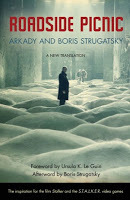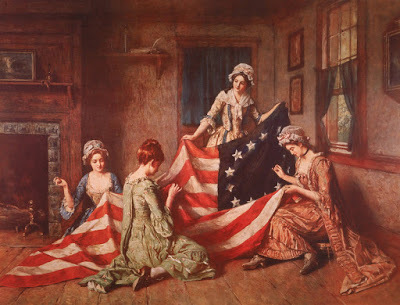Michael Swanwick's Blog, page 178
November 20, 2012
Boris Strugatsky, 1933 - 2012
.

Science fiction has lost another giant. Boris Strugatsky died yesterday in St. Petersburg at the age of 79. In collaboration with his brother Arkady, who died in 1991, he wrote 27 novels and I don't know how many short stories. Their work was translated and published around the world. Together, they were the most famous Soviet science fiction writers ever.
The quality of the translations of the Strugatskys' works into English varies. But fortunately their single most famous novel novel, Roadside Picnic , has just received a new English language edition.
The premise of Roadside Picnic is that in the recent past powerful and incomprehensible aliens visited several sites on Earth, causing panic and evacuation . . . and then, after doing nobody knows what, departed. Leaving behind a lot of strange artifacts, some of them valuable and most of them extremely dangerous. These zones are fenced off by the government but, because there's profit to be made, criminals go in anyway. Red, the protagonist, is one of these desperate men, these "stalkers," and he is one of our genre's great creations.
You can read io9's enthusiastic review of the new translation here. The book has an introduction by Ursula K. Le Guin and an afterword by Boris Strugatsky in which he details the heartbreaking process by which he and his brother submitted the book to the censor over and over again, removing or rewriting sections of it not for ideological reasons but because the censor thought of science fiction as a children's literature and thought Red should behave in a more uplifting fashion.
 The new edition restores the original material, making a great book even greater. If you haven't read Roadside Picnic, then you really should. Be sure to pick up the the Chicago Review Press version, with the cover image (right) taken from
Stalker
, a movie based on the novel.
The new edition restores the original material, making a great book even greater. If you haven't read Roadside Picnic, then you really should. Be sure to pick up the the Chicago Review Press version, with the cover image (right) taken from
Stalker
, a movie based on the novel.
I am sure there will be many memorials posted across the Web and around the world in days to come. In the meantime, you can read the Locus notice here.
*

Science fiction has lost another giant. Boris Strugatsky died yesterday in St. Petersburg at the age of 79. In collaboration with his brother Arkady, who died in 1991, he wrote 27 novels and I don't know how many short stories. Their work was translated and published around the world. Together, they were the most famous Soviet science fiction writers ever.
The quality of the translations of the Strugatskys' works into English varies. But fortunately their single most famous novel novel, Roadside Picnic , has just received a new English language edition.
The premise of Roadside Picnic is that in the recent past powerful and incomprehensible aliens visited several sites on Earth, causing panic and evacuation . . . and then, after doing nobody knows what, departed. Leaving behind a lot of strange artifacts, some of them valuable and most of them extremely dangerous. These zones are fenced off by the government but, because there's profit to be made, criminals go in anyway. Red, the protagonist, is one of these desperate men, these "stalkers," and he is one of our genre's great creations.
You can read io9's enthusiastic review of the new translation here. The book has an introduction by Ursula K. Le Guin and an afterword by Boris Strugatsky in which he details the heartbreaking process by which he and his brother submitted the book to the censor over and over again, removing or rewriting sections of it not for ideological reasons but because the censor thought of science fiction as a children's literature and thought Red should behave in a more uplifting fashion.
 The new edition restores the original material, making a great book even greater. If you haven't read Roadside Picnic, then you really should. Be sure to pick up the the Chicago Review Press version, with the cover image (right) taken from
Stalker
, a movie based on the novel.
The new edition restores the original material, making a great book even greater. If you haven't read Roadside Picnic, then you really should. Be sure to pick up the the Chicago Review Press version, with the cover image (right) taken from
Stalker
, a movie based on the novel. I am sure there will be many memorials posted across the Web and around the world in days to come. In the meantime, you can read the Locus notice here.
*
Published on November 20, 2012 07:43
November 19, 2012
"Divine Intervention May Well Be Involved"
.

I drove out to Maple Tree Farm this morning to pick up our organic, free-range, ecologically virtuous, and quite possibly spiritually-enlightened turkey for Thanksgiving dinner and discovered that we'd just bought a 34-pound bird. There's going to be leftovers this holiday!
And you know you like a book when . . .
Blurbing a book is kind of a drag. It takes real work to come up with something good, something that might convince a wavering browser that this book is something he or she will really enjoy. Mere praise isn't good enough -- it has to be targeted praise, words that will make those readers who will like this particular book realize that this particular book is the sort of thing they'll like. A blurb that will work for Moby-Dick will fall flat on an Agatha Christie novel.
So writing a blurb takes time. Worse, periodically I run short on time. Which is why I have a backlog of eight books I'm pretty sure I would like if I read them which I promised to blurb if I could only find the time, and yet (cough!) have not.
So the way the hierarchy breaks down is: It's a compliment if I apologize for not having the time to write a blurb. Because I'm pretty sure I would if I could. It's a greater compliment if I actually write one. And it's the biggest compliment of all if I'm thrilled to see it on the back cover of the book.
The other day I received a copy of Michael Andre-Driussi's Gate of Horn, Book of Silk: A Guide to Gene Wolfe's The Book of the Long Sun and The Book of the Short Sun . There at the top of the back cover were the words:
"Divine intervention may well be involved." -- Michael Swanwick, Flogging Babel
Which made me feel doubly happy because not only was my name on the back of a book I particularly admired, but the blurb was taken from my happy gush of words, posted on this blog, on receiving an advance copy of the book. So I had all the pleasures of blogging with none of the work.
My original post about the book can be found here. To it I will only add that this is one physically beautiful book. I'm extraordinarily happy to have it.
Above: Yes, that's a tree-baling machine. For Christmas trees. At the farm market. The dam that was Thanksgiving has broken and the flood of Xmas marketing is now raging at top speed toward Halloween. It's possible we may live to see the Christmas sales starting on the fifth of July. And our great-great-grandchildren...?
*

I drove out to Maple Tree Farm this morning to pick up our organic, free-range, ecologically virtuous, and quite possibly spiritually-enlightened turkey for Thanksgiving dinner and discovered that we'd just bought a 34-pound bird. There's going to be leftovers this holiday!
And you know you like a book when . . .
Blurbing a book is kind of a drag. It takes real work to come up with something good, something that might convince a wavering browser that this book is something he or she will really enjoy. Mere praise isn't good enough -- it has to be targeted praise, words that will make those readers who will like this particular book realize that this particular book is the sort of thing they'll like. A blurb that will work for Moby-Dick will fall flat on an Agatha Christie novel.
So writing a blurb takes time. Worse, periodically I run short on time. Which is why I have a backlog of eight books I'm pretty sure I would like if I read them which I promised to blurb if I could only find the time, and yet (cough!) have not.
So the way the hierarchy breaks down is: It's a compliment if I apologize for not having the time to write a blurb. Because I'm pretty sure I would if I could. It's a greater compliment if I actually write one. And it's the biggest compliment of all if I'm thrilled to see it on the back cover of the book.
The other day I received a copy of Michael Andre-Driussi's Gate of Horn, Book of Silk: A Guide to Gene Wolfe's The Book of the Long Sun and The Book of the Short Sun . There at the top of the back cover were the words:
"Divine intervention may well be involved." -- Michael Swanwick, Flogging Babel
Which made me feel doubly happy because not only was my name on the back of a book I particularly admired, but the blurb was taken from my happy gush of words, posted on this blog, on receiving an advance copy of the book. So I had all the pleasures of blogging with none of the work.
My original post about the book can be found here. To it I will only add that this is one physically beautiful book. I'm extraordinarily happy to have it.
Above: Yes, that's a tree-baling machine. For Christmas trees. At the farm market. The dam that was Thanksgiving has broken and the flood of Xmas marketing is now raging at top speed toward Halloween. It's possible we may live to see the Christmas sales starting on the fifth of July. And our great-great-grandchildren...?
*
Published on November 19, 2012 13:29
November 16, 2012
Flogging Gardner Dozois
.

Ordinarily, I only push my own books here. But I'm going to make an exception this once, because Baen Books is selling a bundle of seven e-books -- five brilliant story collections, one brilliant novel, and one potboiler -- by Gardner Dozois. This is very close to everything he's ever written, and at twenty-five dollars, it's a bargain.
Should you buy it? Well, if you've already some of Gardner's work, you know the answer. But if you haven't . . . if you're one of those far too many people who are aware that Gardner is a brilliant, award-winning editor but haven't read any of his fiction . . . then yes, absolutely.
Here's what I wrote in the introduction to Strange Days:
Which was true then, and is true now. In addition to Strange Days , the bundle includes the collections A Day in the Life , Another World , The Visible Man , Morning Child and Other Stories , the stunning novel Strangers , and Nightmare Blue (the potboiler). Even Homer wrote the occasional novel about a policeman tracking down a shape-shifting alien drug dealer.
You can find the bundle of two novels and five short story collections here.
And . . .
 Hero small-press publisher Michael Walsh would be very annoyed at me if I didn't mention that he still has copies of
Being Gardner Dozois
for sale. This is a book-length interview I conducted with Gardner covering all his short fiction, story by story, in the order published, from "The Empty Man" ("Sucks! is the way we describe it in technical language," Gardner summarized) to "A Knight of Ghosts and Shadows," which he began in 1978 and finished twenty years later.
Hero small-press publisher Michael Walsh would be very annoyed at me if I didn't mention that he still has copies of
Being Gardner Dozois
for sale. This is a book-length interview I conducted with Gardner covering all his short fiction, story by story, in the order published, from "The Empty Man" ("Sucks! is the way we describe it in technical language," Gardner summarized) to "A Knight of Ghosts and Shadows," which he began in 1978 and finished twenty years later.
In the interview I asked Gardner what did and didn't work about each story and he he was astonishingly frank, frequently funny, and always insightful. I think of the book as a kind of postgraduate course for writers.
Also, it has a great cover by Omar Rayyan. When Gardner's grandson with a little boy, the first thing he wanted to see whenever he came to visit was "the picture of Pop-Pop with the top of his head off."
Available from the usual sources or direct from Old Earth Books.
*

Ordinarily, I only push my own books here. But I'm going to make an exception this once, because Baen Books is selling a bundle of seven e-books -- five brilliant story collections, one brilliant novel, and one potboiler -- by Gardner Dozois. This is very close to everything he's ever written, and at twenty-five dollars, it's a bargain.
Should you buy it? Well, if you've already some of Gardner's work, you know the answer. But if you haven't . . . if you're one of those far too many people who are aware that Gardner is a brilliant, award-winning editor but haven't read any of his fiction . . . then yes, absolutely.
Here's what I wrote in the introduction to Strange Days:
Imagine you’re at a party in Gardner’s apartment. It’s not large, but he’s invited swarms of people, so it’s very crowded. Gardner keeps his awards on a little table not far from the door. People who have never been there before, young editors and the like, will eventually drift over to admire the thicket of Hugos for his work as an editor, and while there notice two Nebulas gleaming in their midst. Inevitably, someone will say, “I didn’t know Gardner was a writer.”
“Oh, yes,” one of us Old Hands will reply (we linger near the trophy table for this very purpose), “Gardner’s a much better writer than he is an editor!”
Which was true then, and is true now. In addition to Strange Days , the bundle includes the collections A Day in the Life , Another World , The Visible Man , Morning Child and Other Stories , the stunning novel Strangers , and Nightmare Blue (the potboiler). Even Homer wrote the occasional novel about a policeman tracking down a shape-shifting alien drug dealer.
You can find the bundle of two novels and five short story collections here.
And . . .
 Hero small-press publisher Michael Walsh would be very annoyed at me if I didn't mention that he still has copies of
Being Gardner Dozois
for sale. This is a book-length interview I conducted with Gardner covering all his short fiction, story by story, in the order published, from "The Empty Man" ("Sucks! is the way we describe it in technical language," Gardner summarized) to "A Knight of Ghosts and Shadows," which he began in 1978 and finished twenty years later.
Hero small-press publisher Michael Walsh would be very annoyed at me if I didn't mention that he still has copies of
Being Gardner Dozois
for sale. This is a book-length interview I conducted with Gardner covering all his short fiction, story by story, in the order published, from "The Empty Man" ("Sucks! is the way we describe it in technical language," Gardner summarized) to "A Knight of Ghosts and Shadows," which he began in 1978 and finished twenty years later. In the interview I asked Gardner what did and didn't work about each story and he he was astonishingly frank, frequently funny, and always insightful. I think of the book as a kind of postgraduate course for writers.
Also, it has a great cover by Omar Rayyan. When Gardner's grandson with a little boy, the first thing he wanted to see whenever he came to visit was "the picture of Pop-Pop with the top of his head off."
Available from the usual sources or direct from Old Earth Books.
*
Published on November 16, 2012 09:43
November 15, 2012
A Puzzling Plot Twist
.

I saw Skyfall the other day and found it a pleasant diversion. It's amazing to contemplate the fact that over the past half-century James Bond has gone from remarking that he would never listen to the Beatles without earmuffs to making a quip suggesting that he thinks being homophobic is uncool. That's some major consciousness-raising.
But would someone explain to me what's up with Silva arranging to be captured by his enemies so he can be placed in an inescapable glass box within their headquarters and then break out and attack them from within? (Above.) Not only this a move that only a moron could come up with, but it's exactly the same one that Loki pulled in The Avengers . (Below.) Are both movies quoting a classic -- and monumentally stupid -- bad film I haven't heard of or what?
And as always . . .
I'm still on the road. The Unlikely Adventures of Me will resume on my return.

*


I saw Skyfall the other day and found it a pleasant diversion. It's amazing to contemplate the fact that over the past half-century James Bond has gone from remarking that he would never listen to the Beatles without earmuffs to making a quip suggesting that he thinks being homophobic is uncool. That's some major consciousness-raising.
But would someone explain to me what's up with Silva arranging to be captured by his enemies so he can be placed in an inescapable glass box within their headquarters and then break out and attack them from within? (Above.) Not only this a move that only a moron could come up with, but it's exactly the same one that Loki pulled in The Avengers . (Below.) Are both movies quoting a classic -- and monumentally stupid -- bad film I haven't heard of or what?
And as always . . .
I'm still on the road. The Unlikely Adventures of Me will resume on my return.

*
Published on November 15, 2012 00:00
November 14, 2012
Moderating Panels?
.

As always, I'm on the road again. Since I don't have the time to write anything substantial, I thought that instead I'd ask a question.
Last weekend, I was at a convention and showed up for a panel to discover that, without being told, I'd been made the moderator. The woman assigned the role told the con committee she wouldn't do it and then printed out the email from them saying they'd shifted off the responsibility to me.
Without telling me, of course.
Well, that's par for the course. But when I fired up the discussion, five seconds later, I had a panel consisting of myself, two Big Name People who were self-evidently qualified to discuss the topic, and two new writers who quite understandably were reluctant to inject themselves into the conversation.
Here's the question: Given two people who were obviously smart but of whose work I knew nothing... what ought I have done to involve them in the panel? Half the questions I lobbed their way were useless because they presupposed knowledge they didn't have. I was in their situation back in the day, so I know that they had contributions to make, and when they did speak up what they said was interesting and to the point. But mostly they were silent.
So what should I have done? What could I have done? What might I do when I find myself in this situation in the future?
Your ideas would be welcome.
*

As always, I'm on the road again. Since I don't have the time to write anything substantial, I thought that instead I'd ask a question.
Last weekend, I was at a convention and showed up for a panel to discover that, without being told, I'd been made the moderator. The woman assigned the role told the con committee she wouldn't do it and then printed out the email from them saying they'd shifted off the responsibility to me.
Without telling me, of course.
Well, that's par for the course. But when I fired up the discussion, five seconds later, I had a panel consisting of myself, two Big Name People who were self-evidently qualified to discuss the topic, and two new writers who quite understandably were reluctant to inject themselves into the conversation.
Here's the question: Given two people who were obviously smart but of whose work I knew nothing... what ought I have done to involve them in the panel? Half the questions I lobbed their way were useless because they presupposed knowledge they didn't have. I was in their situation back in the day, so I know that they had contributions to make, and when they did speak up what they said was interesting and to the point. But mostly they were silent.
So what should I have done? What could I have done? What might I do when I find myself in this situation in the future?
Your ideas would be welcome.
*
Published on November 14, 2012 00:00
November 13, 2012
The Red-Shirt Conspiracy Redux
.

Remember the strange events I reported happening on election day?
If you don't, here's a quick recap: Republicans made a major push to put minority observers in Philadelphia polling places, which (because of how the laws are phrased) meant they displaced existing poll workers. Some were challenged and the folks who'd had the positions for years kept them. The minority observers were all visited by people who told them they had to wear red tee-shirts. Which, since it's against the law for poll workers to wear anything indicating party affiliation (voters, however, get a free pass and God bless America for that), was borderline illegal. And, finally, any of the minority observers who were challenged for wearing gang colors or for displacing old cronies, did not stay to argue but immediately left. Leaving the polling place undermanned.
Weird, huh?
A friend came up with an explanation. Purely theoretical, I emphasize. He said that these events were a loaded gun whose trigger was not pulled. The Republican party, remember, thought this election would be as close as close, possibly a matter of hundreds of votes. So, just in case Obama won by a hair and Pennsylvania could decide the election, they planted the grounds for a challenge and a recount.
Then, because the election wasn't at all close here, they did nothing.
I report this only because it's interesting and I for one was curious as to what the heck was going on. But let's not rush to demonize the Republicans here. This is, after all, Philadelphia, which was once characterized as being "corrupt and content." Nobody who loves this city would pretend that the Democratic machine was any cleaner.
But maybe four years from now the poll workers should be educated as to what to do if something similar happens again.
*


Remember the strange events I reported happening on election day?
If you don't, here's a quick recap: Republicans made a major push to put minority observers in Philadelphia polling places, which (because of how the laws are phrased) meant they displaced existing poll workers. Some were challenged and the folks who'd had the positions for years kept them. The minority observers were all visited by people who told them they had to wear red tee-shirts. Which, since it's against the law for poll workers to wear anything indicating party affiliation (voters, however, get a free pass and God bless America for that), was borderline illegal. And, finally, any of the minority observers who were challenged for wearing gang colors or for displacing old cronies, did not stay to argue but immediately left. Leaving the polling place undermanned.
Weird, huh?
A friend came up with an explanation. Purely theoretical, I emphasize. He said that these events were a loaded gun whose trigger was not pulled. The Republican party, remember, thought this election would be as close as close, possibly a matter of hundreds of votes. So, just in case Obama won by a hair and Pennsylvania could decide the election, they planted the grounds for a challenge and a recount.
Then, because the election wasn't at all close here, they did nothing.
I report this only because it's interesting and I for one was curious as to what the heck was going on. But let's not rush to demonize the Republicans here. This is, after all, Philadelphia, which was once characterized as being "corrupt and content." Nobody who loves this city would pretend that the Democratic machine was any cleaner.
But maybe four years from now the poll workers should be educated as to what to do if something similar happens again.
*
Published on November 13, 2012 07:10
November 12, 2012
This Glitteratti Life Part 6,398
.

Another year, another Philcon. Some of the panels went swimmingly while others sank beneath our wisdom like a stone. But I took photos of many good people, some of which are presented here.

The dapper Tom Purdom


Book dealers, Art and Becky Henderson, Lorna Carlson, and Chris Edwards
Writer Fran Wilde

Gardner Dozois in a subdued mood

Oz Drummond, overcome with joy

Genius comic artist Phil Foglio
And for those who require literary substance . . .
I recently read a very thoughtful essay on creator rights by Scott R. Kurtz, creator of the PVP cartoon. Oversimplifying wildly, I can sum up what he has to say as: Evil corporations don't steal creator rights; creators give away those rights and complain about it afterward. He also explains how you and I can prevent that happening.
You can read the essay here.
And, sadly . . .
T. S. Eliot's widow, Valerie Eliot died the other day. She had a reputation as a dragon because she was very protective of her late husband's reputation. But when I asked her permission to quote one of his unpublished letters for my biography of Hope Mirrlees, she very kindly granted it. I got one heck of a kick out of that.
Top: Editor, scholar, book dealer and bon vivant David Hartwell. With, oddly enough, snickerdoodles.
*

Another year, another Philcon. Some of the panels went swimmingly while others sank beneath our wisdom like a stone. But I took photos of many good people, some of which are presented here.

The dapper Tom Purdom


Book dealers, Art and Becky Henderson, Lorna Carlson, and Chris Edwards
Writer Fran Wilde

Gardner Dozois in a subdued mood

Oz Drummond, overcome with joy

Genius comic artist Phil Foglio
And for those who require literary substance . . .
I recently read a very thoughtful essay on creator rights by Scott R. Kurtz, creator of the PVP cartoon. Oversimplifying wildly, I can sum up what he has to say as: Evil corporations don't steal creator rights; creators give away those rights and complain about it afterward. He also explains how you and I can prevent that happening.
You can read the essay here.
And, sadly . . .
T. S. Eliot's widow, Valerie Eliot died the other day. She had a reputation as a dragon because she was very protective of her late husband's reputation. But when I asked her permission to quote one of his unpublished letters for my biography of Hope Mirrlees, she very kindly granted it. I got one heck of a kick out of that.
Top: Editor, scholar, book dealer and bon vivant David Hartwell. With, oddly enough, snickerdoodles.
*
Published on November 12, 2012 11:05
November 9, 2012
Philcon and the End of the Auction
.

The auction for the framed, signed typescript of "From Ghoulies and Ghosties, Long-Leggitie Beasties..." ends in only a couple of hours. There's still time to bid and still time to watch and root.
Remember, all proceeds go to Clarion West Writers Workshop, which is that most honorable of institutions, one that works hard to ensure that we'll have fantasy and science fiction stories in the coming decades.
You can find the auction here.
And this weekend . . .
In a few hours I head out for Philcon, currently held in Cherry Hill, NJ. (For which reason, my son's waggish friends refer to it as Chillcon.) It should be fun.
My current schedule is:
Friday
7:00 PM in Crystal Ballroom Two WHAT MAKES AN SF WORK ENDURE? [with Alexis Gilliland (mod), Andrew Breslin, Lee Gilliland, and Sam Lubell]
8:00 PM in Plaza IV WHO ARE THE GREAT WRITERS OF SCIENCE FICTION? [with Sam Lubell (mod), Theodore Krulik, David Hartwell, and Michael Walsh]
11:00 PM in Crystal Ballroom Three DRUGS AND THE WORKS OF PHILIP K. DICK [with Tom Doyle (mod), April Grey, Andrew C. Murphy, and Bernie Mojzes]
Saturday
12:00 PM in Plaza V RAY BRADBURY TRIBUTE PANEL [with Susan Casper (mod), Marilyn "Mattie" Brahen, Marvin Kaye, Steve Vertlieb,]
1:00 PM in Autograph Table AUTOGRAPH SESSION 1:00 - 2:00 (1276)
2:00 PM in Plaza V WHERE DO YOU GET YOUR IDEAS? [with Oz Drummond (mod), Ty Drago, Tim W. Burke, and Mike McPhail]
5:00 PM in Plaza III COMPLETELY OBSOLETE NOTIONS (1126) [with Darrell Schweitzer (mod), Lee Gilliland, Brian Thomas, and Earl Bennett]
7:00 PM in Plaza V HAS THE COMMERCIAL IMPACT OF TOLKIEN HARMED FANTASY? (1190)[with Ellen Asher (mod), Daniel Grotta, Allyn Gibson, and Sarah Hunter]
If you're there, be sure to say hi.
Above: The fabled item itself, posed between my bust of Surplus and a lantern filled with keys. I'm going to miss that thing. But it's for a worthy cause.
*

The auction for the framed, signed typescript of "From Ghoulies and Ghosties, Long-Leggitie Beasties..." ends in only a couple of hours. There's still time to bid and still time to watch and root.
Remember, all proceeds go to Clarion West Writers Workshop, which is that most honorable of institutions, one that works hard to ensure that we'll have fantasy and science fiction stories in the coming decades.
You can find the auction here.
And this weekend . . .
In a few hours I head out for Philcon, currently held in Cherry Hill, NJ. (For which reason, my son's waggish friends refer to it as Chillcon.) It should be fun.
My current schedule is:
Friday
7:00 PM in Crystal Ballroom Two WHAT MAKES AN SF WORK ENDURE? [with Alexis Gilliland (mod), Andrew Breslin, Lee Gilliland, and Sam Lubell]
8:00 PM in Plaza IV WHO ARE THE GREAT WRITERS OF SCIENCE FICTION? [with Sam Lubell (mod), Theodore Krulik, David Hartwell, and Michael Walsh]
11:00 PM in Crystal Ballroom Three DRUGS AND THE WORKS OF PHILIP K. DICK [with Tom Doyle (mod), April Grey, Andrew C. Murphy, and Bernie Mojzes]
Saturday
12:00 PM in Plaza V RAY BRADBURY TRIBUTE PANEL [with Susan Casper (mod), Marilyn "Mattie" Brahen, Marvin Kaye, Steve Vertlieb,]
1:00 PM in Autograph Table AUTOGRAPH SESSION 1:00 - 2:00 (1276)
2:00 PM in Plaza V WHERE DO YOU GET YOUR IDEAS? [with Oz Drummond (mod), Ty Drago, Tim W. Burke, and Mike McPhail]
5:00 PM in Plaza III COMPLETELY OBSOLETE NOTIONS (1126) [with Darrell Schweitzer (mod), Lee Gilliland, Brian Thomas, and Earl Bennett]
7:00 PM in Plaza V HAS THE COMMERCIAL IMPACT OF TOLKIEN HARMED FANTASY? (1190)[with Ellen Asher (mod), Daniel Grotta, Allyn Gibson, and Sarah Hunter]
If you're there, be sure to say hi.
Above: The fabled item itself, posed between my bust of Surplus and a lantern filled with keys. I'm going to miss that thing. But it's for a worthy cause.
*
Published on November 09, 2012 07:41
November 8, 2012
Something's Happening Here . . .
.

This is mysterious. My son Sean came back from a day as a poll worker to report with what sounds like half a conspiracy theory.
This year, it seems, the state Republican party made a major push to put "minority observers" in Philadelphia polling places. Since each polling place can have only so many workers, this meant that some long-time workers were displaced. Some of the displaced workers challenged the displacements and the judges sided with some of them and said they could keep their positions, which meant that there would be no minority observer at their polling place.
Got that? Now it gets odd. On election day, all the minority observers showed up in bright red shirts. Plus, the workers who hadn't been displaced by minority observers had people show up at their houses beforehand who gave them bright red shirts and told them they were required to wear them at the polls.
It's illegal for poll workers to wear anything indicating political affiliation at the voting place.
Now, some of the minority observers were confronted for wearing gang colors or because they'd displaced long-term cronies of those who remained. To a man and woman they did not argue, but turned around and immediately left. Which meant that the polls were undermanned.
Now, supposedly, the commonwealth Republican establishment is outraged at the treatment of the minority observers.
Aaaannnnddd . . . that's it. Whatever's happening here -- if anything -- is not exactly clear. Nor what the Republicans could possibly hope to get out of the situation. But it's interesting, no?
This is politics as it's played in Pennsylvania. "Land of Giants," as Steve Lopez used to say.
And speaking of collectibles . . .
The Ebay auction for the framed and signed typescript of "From Ghoulies and Ghosties, Long-Leggitie Beasties . . ." ends tomorrow at 10:56:32 Pacific Daylight Time. So if you're a collector or if you're simply curious as to how much such items go for, that's the place to be.
Remember, every penny goes to Clarion West Writers Workshop.
The story is on sale here. And it can be read here.
*

This is mysterious. My son Sean came back from a day as a poll worker to report with what sounds like half a conspiracy theory.
This year, it seems, the state Republican party made a major push to put "minority observers" in Philadelphia polling places. Since each polling place can have only so many workers, this meant that some long-time workers were displaced. Some of the displaced workers challenged the displacements and the judges sided with some of them and said they could keep their positions, which meant that there would be no minority observer at their polling place.
Got that? Now it gets odd. On election day, all the minority observers showed up in bright red shirts. Plus, the workers who hadn't been displaced by minority observers had people show up at their houses beforehand who gave them bright red shirts and told them they were required to wear them at the polls.
It's illegal for poll workers to wear anything indicating political affiliation at the voting place.
Now, some of the minority observers were confronted for wearing gang colors or because they'd displaced long-term cronies of those who remained. To a man and woman they did not argue, but turned around and immediately left. Which meant that the polls were undermanned.
Now, supposedly, the commonwealth Republican establishment is outraged at the treatment of the minority observers.
Aaaannnnddd . . . that's it. Whatever's happening here -- if anything -- is not exactly clear. Nor what the Republicans could possibly hope to get out of the situation. But it's interesting, no?
This is politics as it's played in Pennsylvania. "Land of Giants," as Steve Lopez used to say.
And speaking of collectibles . . .
The Ebay auction for the framed and signed typescript of "From Ghoulies and Ghosties, Long-Leggitie Beasties . . ." ends tomorrow at 10:56:32 Pacific Daylight Time. So if you're a collector or if you're simply curious as to how much such items go for, that's the place to be.
Remember, every penny goes to Clarion West Writers Workshop.
The story is on sale here. And it can be read here.
*
Published on November 08, 2012 00:00
November 7, 2012
Commodity Fantasy
.

The other day, David Stone posted a thoughtful response to a blog entry here, noting that he had been shocked to learn that a lot of the really bad fantasy he read as an adolescent was consumed by adult readers.
Critic John Clute coined a term which explains this phenomenon and, since it's a useful one, I thought I'd share it with you: Commodity Fantasy.
Commodity fantasy is work whose main purpose is not to give the reader a satisfying experience, but to buy the next book in the series. It's important that such a work leave the reader a little unhappy, a little dissatisfied, a little edgy -- and anxious to snatch up the next volume in the hope that it will provide the experience that the last book failed to. The more like a pack of cigarettes (if you've never smoked, trust me -- cigarettes temporarily ease the craving but they never quite satisfy it) a commodity fantasy is, the more successful it will be.
Robert E. Howard's Conan the Barbarian stories had some of the qualities of commodity fantasy. Conan, it was stated up front was destined "to tread the jeweled thrones of the Earth under his sandalled feet." But the Kull stories had taught Howard that all the fun was to be had during Conan's adventurous years and would abruptly cease once he became king. So the reader never was going to see him fulfill his destiny.
Later, John Jakes' Brak the Barbarian stories took the Conan matrix and turned it into a cartoon of itself. When we meet Brak, he's decided to make a trek to Khurdisan the Golden, the southernmost city of his world, apparently because it sounds kind of neat. Story by story, he fights monsters and acquires supernatural enemies who try to stop him from reaching Khurdisan.
I read the Brak books when I was young because I read every fantasy book that came out. There simply weren't that many of them. For a time, I kept reading them because I wanted to know what would happen when he reached Khurdisan. But finally I realized that he never would.
That's simply not what commodity fantasy does.
John Jakes went on to have a smash series of Civil War novels, and I went on to read other and better stuff. Samuel Johnson was right when he said, "Why, let him read what he will. He'll come round to better, by and by." I don't suppose that reading commodity fantasy is any worse for you than smoking cigarettes -- something else I used to do -- and it's a heck of a lot easier to give up.
Oh, and . . .
If you're in the market for an enigma machine, one is going up for auction in London. It's expected to bring in forty to sixty thousand pounds.
You can read about it here.
Above: There it is, the holy item itself.
*

The other day, David Stone posted a thoughtful response to a blog entry here, noting that he had been shocked to learn that a lot of the really bad fantasy he read as an adolescent was consumed by adult readers.
Critic John Clute coined a term which explains this phenomenon and, since it's a useful one, I thought I'd share it with you: Commodity Fantasy.
Commodity fantasy is work whose main purpose is not to give the reader a satisfying experience, but to buy the next book in the series. It's important that such a work leave the reader a little unhappy, a little dissatisfied, a little edgy -- and anxious to snatch up the next volume in the hope that it will provide the experience that the last book failed to. The more like a pack of cigarettes (if you've never smoked, trust me -- cigarettes temporarily ease the craving but they never quite satisfy it) a commodity fantasy is, the more successful it will be.
Robert E. Howard's Conan the Barbarian stories had some of the qualities of commodity fantasy. Conan, it was stated up front was destined "to tread the jeweled thrones of the Earth under his sandalled feet." But the Kull stories had taught Howard that all the fun was to be had during Conan's adventurous years and would abruptly cease once he became king. So the reader never was going to see him fulfill his destiny.
Later, John Jakes' Brak the Barbarian stories took the Conan matrix and turned it into a cartoon of itself. When we meet Brak, he's decided to make a trek to Khurdisan the Golden, the southernmost city of his world, apparently because it sounds kind of neat. Story by story, he fights monsters and acquires supernatural enemies who try to stop him from reaching Khurdisan.
I read the Brak books when I was young because I read every fantasy book that came out. There simply weren't that many of them. For a time, I kept reading them because I wanted to know what would happen when he reached Khurdisan. But finally I realized that he never would.
That's simply not what commodity fantasy does.
John Jakes went on to have a smash series of Civil War novels, and I went on to read other and better stuff. Samuel Johnson was right when he said, "Why, let him read what he will. He'll come round to better, by and by." I don't suppose that reading commodity fantasy is any worse for you than smoking cigarettes -- something else I used to do -- and it's a heck of a lot easier to give up.
Oh, and . . .
If you're in the market for an enigma machine, one is going up for auction in London. It's expected to bring in forty to sixty thousand pounds.
You can read about it here.
Above: There it is, the holy item itself.
*
Published on November 07, 2012 10:21
Michael Swanwick's Blog
- Michael Swanwick's profile
- 546 followers
Michael Swanwick isn't a Goodreads Author
(yet),
but they
do have a blog,
so here are some recent posts imported from
their feed.



